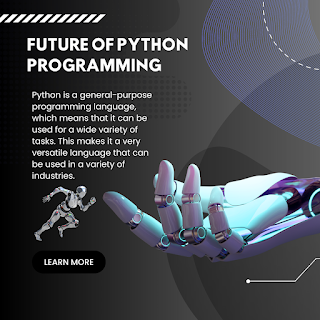Exploring the Power of Python in Modern Technology: A Student’s Perspective
As an MCA student, I’ve had the opportunity to explore numerous programming languages and technologies. Yet, if there’s one language that has truly stood out in my journey, it’s Python. Whether you’re building machine learning models, developing web applications, or automating mundane tasks, Python offers versatility that makes it a go-to choice for tech professionals and students alike. In this blog, I’ll share why Python has become the backbone of modern technology and how it’s shaped my learning experience.
Why Python is the Future of Technology
When I first started learning Python, I wasn’t sure what all the fuss was about. At first glance, it seemed like just another language to learn. However, as I delved deeper, I realized that Python is not only one of the easiest languages to learn, but it also powers some of the most advanced technological innovations today. Let’s look at why it stands out:
Simple and Readable Syntax: Python’s syntax is straightforward and closely resembles natural language. This makes it an excellent starting point for students like me who are transitioning from basic programming to more complex concepts. Whether you're just starting with programming or you're already proficient, Python makes it easy to understand logic and structure.
Wide Range of Applications: From web development with frameworks like Django and Flask to data science with libraries like NumPy, pandas, and TensorFlow, Python is everywhere. As an MCA student, I’ve used Python in various fields—from implementing machine learning algorithms to creating data visualization dashboards with Matplotlib and Seaborn.
Huge Community and Resources: Python has an expansive community that is constantly creating new libraries, frameworks, and tools. Whenever I’ve faced challenges, I’ve found support in forums like Stack Overflow and resources like Python’s official documentation, GitHub, and Kaggle. This accessibility makes it easy for students and professionals alike to solve problems and learn new concepts.
Python in Real-World Applications
In addition to being a student-friendly language, Python is highly practical. Let me walk you through a few technologies that leverage Python and make it a cornerstone of innovation:
Machine Learning & Artificial Intelligence: Python is a popular choice for building machine learning models. Libraries like scikit-learn, Keras, and TensorFlow enable easy implementation of algorithms such as regression, classification, and clustering. I’ve used Python to work on various machine learning projects, including crop prediction systems for farmers, which has been an eye-opening experience.
Data Science & Analytics: With Python, I’ve had the opportunity to manipulate, analyze, and visualize large datasets. Data science tools like pandas for data manipulation and Matplotlib or Seaborn for visualization make Python an indispensable tool for anyone working in the data-driven world.
Automation & Scripting: One of the simplest yet most powerful ways I’ve used Python is for automating repetitive tasks. Whether it’s renaming files, scraping data from websites, or sending automated emails, Python’s BeautifulSoup, Selenium, and os libraries make automation incredibly simple.
Web Development: Python’s role in web development can’t be overstated. With frameworks like Django and Flask, Python allows developers to build scalable, secure, and maintainable web applications. Learning these frameworks as part of my MCA journey has shown me how Python can power everything from small websites to enterprise-level applications.
How Python Is Shaping the Future
The future of Python is incredibly promising. As the world becomes more data-driven, Python is poised to be at the forefront of key industries. Emerging technologies such as AI, IoT, Blockchain, and Quantum Computing are all benefitting from Python’s versatility and ease of use.
For instance, in the world of AI, Python has allowed researchers and developers to experiment with complex algorithms and models that were once only theoretical. Similarly, in the IoT space, Python powers applications that manage and process data from sensors, making it a key player in smart technology.
Why MCA Students Should Master Python
As an MCA student, mastering Python has opened up endless opportunities for me. Whether you’re considering a career in software development, data science, machine learning, or AI, Python offers the tools to excel.
Moreover, Python’s adaptability means that it’s not just limited to one field—it’s a language that connects various domains. Learning Python has equipped me with the skills to tackle diverse technological challenges, and as I prepare to step into the industry, I know this knowledge will continue to be invaluable.
Final Thoughts
Python isn’t just a language; it’s a gateway to some of the most exciting technologies of today and the future. As an MCA student, the skills I’ve gained through Python have not only helped me with academic projects but have also paved the way for exploring real-world solutions. If you’re considering diving into the world of programming or technology, Python is a language that can truly change the way you think and build.
So, whether you’re starting out or looking to expand your knowledge, I encourage you to explore Python. The possibilities are endless!




Comments
Post a Comment